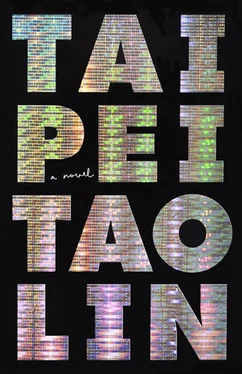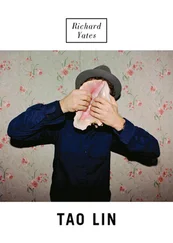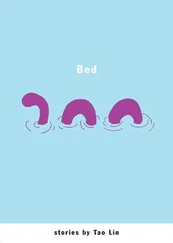It began raining a little from a hazy, cloudless-seeming sky as Paul, 26, and Michelle, 21, walked toward Chelsea to attend a magazine-release party in an art gallery. Paul had resigned to not speaking and was beginning to feel more like he was “moving through the universe” than “walking on a sidewalk.” He stared ahead with a mask-like expression, weakly trying to remember where he was one year ago, last November, more for something to do than because he wanted to know, though he was not incurious. Michelle, to his left, drifted in and out of his peripheral vision — far enough away for pedestrians to pass unknowingly between them — like a slow, amorphous flickering. Paul was thinking the word “somewhere,” meditatively as both placeholder and ends, when Michelle asked if he was okay.
“Yes,” said Paul automatically. As they entered a building, a few minutes later, he sort of glanced at Michelle and was surprised to see her grinning, then couldn’t stop himself from grinning. Sometimes, during an argument, feeling like he’d been acting in a movie and the scene had ended, Paul would suddenly grin, causing Michelle to grin, and they’d be able to enjoy doing things together again, for one to forty hours, but that hadn’t happened this time, partly because Michelle had grinned first. Paul looked away, slightly confused, and suppressed his grin. “What,” he said in an unintentionally loud monotone, unsure what he felt exactly, and they entered a large, mundane elevator, whose door closed slowly.
“What,” said Paul at a normal volume.
“Nothing,” said Michelle still grinning a little.
“Why are you grinning?”
“No reason,” said Michelle.
“What caused you to grin?”
“Nothing. Just life. The situation.”
Entering the party, on the fifth floor, Paul realized he’d said vaguely negative things on the internet, at some point, about a person who was probably in attendance, so walked quickly to Jeremy — an easy-to-talk-to acquaintance — and asked what movies he’d seen recently. Michelle stood at a near distance — partly in view, then obscured, then fully in view — before approaching, with what seemed like a sly smile, to ask if Paul wanted a drink. Jeremy was calculating aloud the per-hour price of a two-part biopic on Che Guevara when Michelle returned with a beer. Paul thanked her and she moved away in an intermittent, curving, crab-like manner, seeming relaxed and disoriented. “She wants to be alone,” thought Paul with some confusion. “Or she wants to let me be alone.”
An hour later they were holding their third or fourth drinks, sitting on chairs in a dark corner, facing what seemed to Paul like one group of sixty to eighty friends. Loud, dancey, mostly electronic music — currently Michael Jackson — played from unseen speakers. Paul was staring at an area of torsos. In his previous relationships, he knew, he had experienced dissatisfaction, to some degree, as an empirically backed enthusiasm for the future, because it implied the possibility of a more satisfying relationship with someone he hadn’t met; with Michelle, whom he felt closer to than his previous girlfriends — he’d told her this a few times, truthfully — dissatisfaction felt more like a personal failing, a direct indication of internal malfunctioning, which he should focus on privately correcting. Instead, he vaguely knew, he was waiting for Michelle, or some combination of Michelle and the world, to endure and overpower his negativity — to be the solution in which he would irreversibly, untraceably dissolve. He sipped his wine, thinking about how Michael Jackson had been using ten to forty Xanax per night, according to the internet, before he died last summer. Paul distractedly scooted his chair toward Michelle and, with unclear purpose, touched her shoulder, tentative and reckless as a child petting a large dog looking elsewhere. Expecting the bored expression of ten minutes ago, when they’d looked at each other noncommittally as she returned to her chair with another drink, Paul was surprised by Michelle’s severely, actively — almost seethingly — depressed expression. Michelle’s face reddened antagonistically, in reflexive defense, it seemed, because then she appeared frustrated and a little confused, then shy and embarrassed. Paul asked if she wanted to leave soon. Michelle hesitated, then asked if that was what Paul wanted.
“I don’t know. Are you hungry?”
“Not really. Are you?”
“I don’t know,” said Paul. “I would eat somewhere.” One night, months ago, they had sat on a curb on Lafayette Street to continue an argument in a resting position. Paul had become distracted by Michelle’s calm, intelligent demeanor and had begun to forget why they were arguing, even while speaking in an agitated voice, as he became fixated, with increasing appreciation, on how Michelle liked him enough to not simply leave and never see him again, which she could do — which anyone could always do, Paul had thought, suddenly intrigued by the concept of gratitude. “Do you want to eat at the Green Table?”
“If that’s what you want,” said Michelle.
“Okay. When do you want to leave?”
“After I finish this glass of wine.”
“Okay,” said Paul, and scooted his chair halfway to where it had been. “I’m going to introduce Kyle to someone. I’ll be back in like five minutes.”
Paul couldn’t find Kyle, 19, or Kyle’s girlfriend, Gabby, 28—his suitemates in an apartment off the Graham L train stop in Brooklyn — and was returning to Michelle when he realized he’d walked past Kyle, standing drunkenly alone in a dense area of people, as if at a concert. After some indecision, briefly motionless, Paul turned around and asked if Kyle wanted to meet Traci. Kyle nodded and followed Paul outside the gallery, to a wide hallway, where six people, including Traci — described earlier by Kyle as “really hot,” by Paul as “her blog gets a lot of hits”—shook hands with one another. Paul grinned uncomfortably as he stared at one person, then another, thinking he had “absolutely nothing” to say, except maybe what he was currently thinking, which didn’t seem appropriate and also kept changing. He noticed Michelle sitting alone, against a wall, around thirty feet away. The front of his head felt extraneous and suctioned as a plastic bag, stuck there in a wind, as he walked to her, aware she had probably seen him grinning at Traci, and asked if she wanted to go now.
“Do you?” said Michelle not standing.
“Yeah,” said Paul looking toward the gallery.
“You can talk to Kyle more, if you want.”
“I don’t want to,” said Paul.
“It seems like you do.”
“I don’t,” said Paul, who viewed friends mostly as means to girlfriends, he knew, contrary to Michelle, who valued them as ends (they’d discussed this a few times and concluded, to some degree, that Paul had his writing, Michelle her friends). “I’m just going to say bye to him. I’ll be right back.” When he couldn’t find Kyle in the hallway he walked robotically into the dark, crowded gallery thinking “lost in the world” in a precariously near-earnest tone. Kyle was standing with a group of people in a sideways manner that didn’t clearly indicate if he knew them or not. He looked at Paul with an expression like he was thinking what to say, then like he was going to insult Paul, then less like he’d chosen to refrain than like he’d lost interest.
“I think Michelle feels like I’m not giving her enough attention,” said Paul slowly.
“That’s funny,” said Kyle after a few seconds. “Because Gabby, after one of our parties, said you gave Michelle so much attention and were always next to her talking to her, but I’m always talking to someone else, and that I don’t love her.”
Читать дальше












